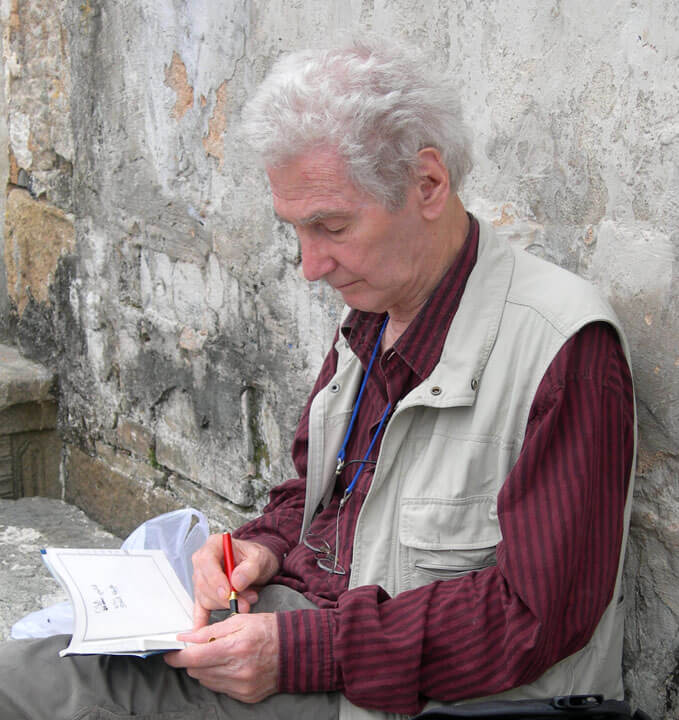Location: Wilson Auditorium
Willis Barnstone was born in Lewiston, Maine, and educated at Bowdoin, Columbia, and Yale. He taught in Greece at the end of the civil war (1949-51), in Buenos Aires during the Dirty War, and during the Cultural Revolution went to China, where he was later a Fulbright Professor of American Literature at Beijing Foreign Studies University (1984-1985). His publications include Modern European Poetry (Bantam, 1967), The Other Bible (HarperCollins, 1984) The Secret Reader: 501 Sonnets (New England, 1996), a memoir biography With Borges on an Ordinary Evening in Buenos Aires (Illinois, 1993), and To Touch the Sky (New Directions, 1999). His literary translation of the New Testament The New Covenant: The Four Gospels and Apocalypse was published by Riverhead Books in 2002. Most recently, he has published two more collections of translations: The Complete Poems of Sappho and The Restored New Testament: A New Translation with Commentary, Including the Gnostic Gospels Thomas, Mary, and Judas. A Guggenheim Fellow and Pulitzer Prize finalist in poetry, Barnstone is Distinguished Professor at Indiana University.
Aliki Barnstone is a poet, translator, critic, and editor. Her books of poems are Blue Earth (Iris, 2004), Wild With It (Sheep Meadow, 2002), a National Books Critics Circle Notable Book, Madly in Love (Carnegie-Mellon, 1997), Windows in Providence (Curbstone, 1981), and The Real Tin Flower (which was introduced by Anne Sexton and was published by Macmillan in 1968, when she was twelve years old). Her translation, The Collected Poems of C.P. Cavafy came out with W.W. Norton in 2006. In 2007, Changing Rapture: Emily Dickinson’s Poetic Development appeared with University Press of New England. She has two books of poems forthcoming: Dr. God, Dear Dr. Heartbreak: New and Selected Poems (the Sheep Meadow Press) and Bright Body (White Pine Press). Barnstone spent the fall of 2006 in Greece as a Senior Fulbright Scholar. Her project was to write a sequence of poems in the voice of an imaginary poet, Eva Victoria Perera, a Sephardic Jew from Thessaloniki, who survives the Holocaust. She is Professor of English in the Creative Writing Program at the University of Missouri, Columbia.
Tony Barnstone is The Albert Upton Professor of English Language and Literature at Whittier College and holds a Masters in English and Creative Writing and Ph.D. in English Literature from U.C. Berkeley. He has won fellowships and poetry awards from the National Endowment for the Arts, the California Arts Council, the Pushcart Prize, the Paumanok Poetry Award, the Randall Jarrell Poetry Prize, The Sow’s Ear Poetry Contest, the Milton Dorfman Poetry Prize, the National Poetry Competition (Chester H. Jones Foundation), the Pablo Neruda Prize in Poetry, the Cecil Hemley Award, and the Poetry Society of America. In 2006 he won the Benjamin Saltman Award in Poetry for his manuscript The Golem of Los Angeles, which was published by Red Hen Press in 2007. He won the John Ciardi Prize in Poetry in 2008 for Tongue of War and won the grand prize in the Strokestown International Poetry Festival, in Strokestown, Ireland, in 2008.
His first book of poetry, Impure, a finalist for the Walt Whitman Prize of the Academy of American Poets, the National Poetry Series Prize, and other national literary competitions, appeared with the University Press of Florida in June of 1999. He is also the author of a chapbook of poems, Naked Magic. His second book of poems, Sad Jazz: Sonnets appeared in 2005 with Sheep Meadow Press. His most recent book of poems, The Golem of Los Angeles, won the Benjamin Saltman Award in Poetry and was published in late 2007 by Red Hen Press. His new project is Pulp Sonnets, a collection of poems based upon classic pulp fiction, comic books, and horror, film noir and sci-fi movies.
